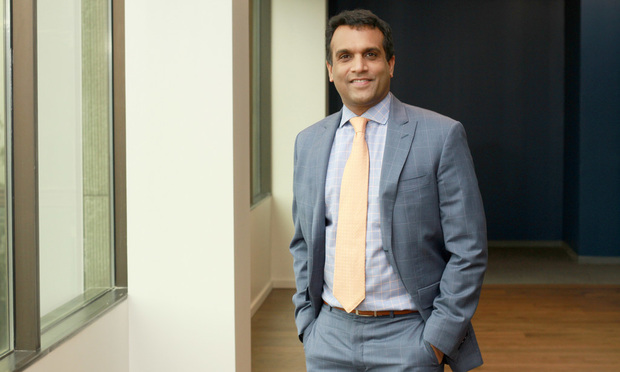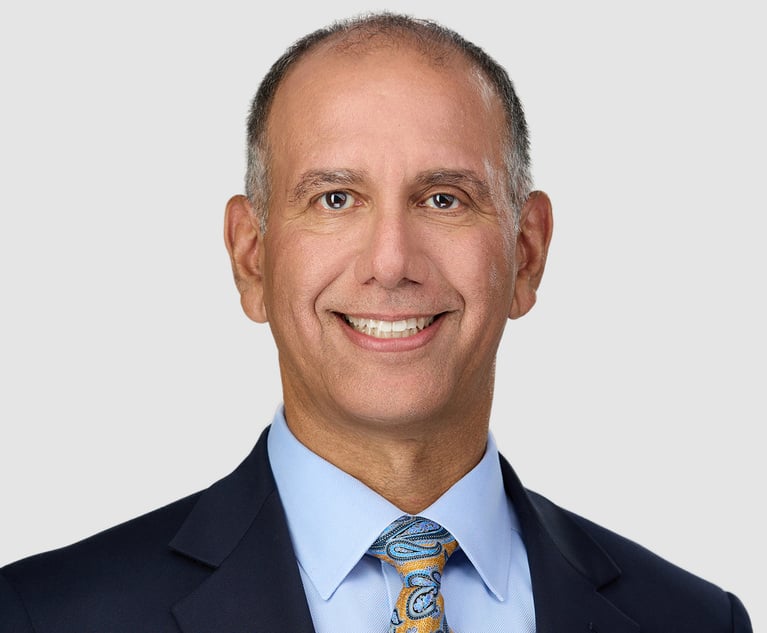From General Counsel to Chief Transformation Officer: What Can Happen When You 'Never Say No'
GC-turned-chief transformation officer Shyam Reddy of BlueLinx Corp., an Atlanta-based wholesale distributor of building products, talks with Corporate Counsel about business opportunities beyond the top-lawyer spot.
February 19, 2019 at 04:07 PM
4 minute read
 Shyam Reddy, with BlueLinx Corp. in Marietta, Georgia. Photo: John Disney/ALM
Shyam Reddy, with BlueLinx Corp. in Marietta, Georgia. Photo: John Disney/ALM
Shyam Reddy has held several titles in his legal career. But it may be his current role—chief transformation officer at BlueLinx Corp.—that may be the most unusual, at least for an attorney who saw his start in the corporate world as a general counsel.
But the position is not totally surprising for a person like Reddy, whose professional philosophy is, “Never say no.”
Reddy joined BlueLinx, an Atlanta-based wholesale distributor of building products, in June 2015 as senior vice president, GC and corporate secretary, overseeing legal, real estate, risk management and information technology matters. He was promoted to chief administrative officer, GC and corporate secretary when he picked up human resources duties in May 2017, and was asked by the BlueLinx CEO and board to serve as chief transformation officer last spring, when it acquired a $1.4 billion company. He also previously held the title of senior vice president, chief administrative officer, GC and corporate secretary at Euramax International Inc., now OmniMax, where he spent two years before joining BlueLinx.
Although he handled the deal as BlueLinx's GC, he now is tasked with integrating the two companies and generating the at least $50 million in synergies it told the market it would create—a role that is wholly business and ideally nothing legal.
“We brought on a new GC, and I'm trying hard not to do legal [work], but when you have a relationship with the organization, it's hard,” Reddy said in an interview with Corporate Counsel.
Although he doesn't hold a CEO title, Reddy is a strong example of the GC-turned-business leader. In his position, he oversees a team of more than 30 people who focus on everything from facility consolidations in overlapping markets to network optimization, from procurement to new organizational structures, policy drafting and the conversion of legacy IT systems onto one enterprise resource planning platform.
“You're working with people in the business in new and exciting ways,” he said. “And I really love being in an executive leadership position on the corporate side because we're in a position to make the decisions that drive value for all of our stakeholders.”
What whetted Reddy's corporate leadership and management appetite, he said, was his three-year stint in the Obama administration, where, as regional administrator of the Southeast sunbelt region of the U.S. General Services Administration, he led a $225 million budget, 1,000-employee organization. When he was offered the opportunity—which, in the ultimate exercise of “never saying no,” he did so without knowing the salary until day one on the job—he was closing in on 10 years at Kilpatrick Townsend & Stockton, where he had spent his entire legal career to date and risen through the ranks to corporate partner.
“When I came back into the corporate world from public service, the CEOs recognized that I had run the regional operations of a large government agency, so even though they brought me in as GC, they expanded my roles when they saw what I could do,” Reddy said.
The key to climbing the corporate ladder in that manner, he added, is the ability to be a good leader and manager—a task accomplished through “caring about your people.”
“You have to strive for excellence, not tolerate mediocrity and push people to their limits while rewarding them at the same time,” he said. “To me, anyone who is in a leadership position has to cultivate that entrepreneurial spirit in their employees to drive them to their best performance. It's important to put people to their highest and best use.”
Although he loved the collegial environment of Big Law, Reddy said he definitely does not want to go back to law firm life. But heading back to the GC chair, and as a better lawyer at that, is not out of the question, he added.
“All the business experience I'm gaining as the chief transformation officer and, before that, the chief administrative officer, make me a better attorney,” Reddy said. “Although I'm not serving in a GC role now, I'm confident the business experience and skills I'm gaining now would make me a more effective general counsel should I take that role in the future.”
This content has been archived. It is available through our partners, LexisNexis® and Bloomberg Law.
To view this content, please continue to their sites.
Not a Lexis Subscriber?
Subscribe Now
Not a Bloomberg Law Subscriber?
Subscribe Now
NOT FOR REPRINT
© 2025 ALM Global, LLC, All Rights Reserved. Request academic re-use from www.copyright.com. All other uses, submit a request to [email protected]. For more information visit Asset & Logo Licensing.
You Might Like
View All
Ex-Red Robin CLO Joins Norton Rose Fulbright After Helping Sell Latest Employer for $4.9 Billion



3D-Printed Homebuilder ICON Hires Former Tesla, Amazon Lawyer as GC
Trending Stories
- 1Sidley Adds Ex-DOJ Criminal Division Deputy Leader, Paul Hastings Adds REIT Partner, in Latest DC Hiring
- 2Justice Delayed is Justice Denied
- 3'It's a Matter of Life and Death:' Ailing Harvey Weinstein Urges Judge to Move Up Retrial
- 4Profits Surge Across Big Law Tiers, but Am Law 50 Segmentation Accelerates
- 5Law Firms Caught Up in Litigation Over Cannabis Grower's Troubles
Who Got The Work
J. Brugh Lower of Gibbons has entered an appearance for industrial equipment supplier Devco Corporation in a pending trademark infringement lawsuit. The suit, accusing the defendant of selling knock-off Graco products, was filed Dec. 18 in New Jersey District Court by Rivkin Radler on behalf of Graco Inc. and Graco Minnesota. The case, assigned to U.S. District Judge Zahid N. Quraishi, is 3:24-cv-11294, Graco Inc. et al v. Devco Corporation.
Who Got The Work
Rebecca Maller-Stein and Kent A. Yalowitz of Arnold & Porter Kaye Scholer have entered their appearances for Hanaco Venture Capital and its executives, Lior Prosor and David Frankel, in a pending securities lawsuit. The action, filed on Dec. 24 in New York Southern District Court by Zell, Aron & Co. on behalf of Goldeneye Advisors, accuses the defendants of negligently and fraudulently managing the plaintiff's $1 million investment. The case, assigned to U.S. District Judge Vernon S. Broderick, is 1:24-cv-09918, Goldeneye Advisors, LLC v. Hanaco Venture Capital, Ltd. et al.
Who Got The Work
Attorneys from A&O Shearman has stepped in as defense counsel for Toronto-Dominion Bank and other defendants in a pending securities class action. The suit, filed Dec. 11 in New York Southern District Court by Bleichmar Fonti & Auld, accuses the defendants of concealing the bank's 'pervasive' deficiencies in regards to its compliance with the Bank Secrecy Act and the quality of its anti-money laundering controls. The case, assigned to U.S. District Judge Arun Subramanian, is 1:24-cv-09445, Gonzalez v. The Toronto-Dominion Bank et al.
Who Got The Work
Crown Castle International, a Pennsylvania company providing shared communications infrastructure, has turned to Luke D. Wolf of Gordon Rees Scully Mansukhani to fend off a pending breach-of-contract lawsuit. The court action, filed Nov. 25 in Michigan Eastern District Court by Hooper Hathaway PC on behalf of The Town Residences LLC, accuses Crown Castle of failing to transfer approximately $30,000 in utility payments from T-Mobile in breach of a roof-top lease and assignment agreement. The case, assigned to U.S. District Judge Susan K. Declercq, is 2:24-cv-13131, The Town Residences LLC v. T-Mobile US, Inc. et al.
Who Got The Work
Wilfred P. Coronato and Daniel M. Schwartz of McCarter & English have stepped in as defense counsel to Electrolux Home Products Inc. in a pending product liability lawsuit. The court action, filed Nov. 26 in New York Eastern District Court by Poulos Lopiccolo PC and Nagel Rice LLP on behalf of David Stern, alleges that the defendant's refrigerators’ drawers and shelving repeatedly break and fall apart within months after purchase. The case, assigned to U.S. District Judge Joan M. Azrack, is 2:24-cv-08204, Stern v. Electrolux Home Products, Inc.
Featured Firms
Law Offices of Gary Martin Hays & Associates, P.C.
(470) 294-1674
Law Offices of Mark E. Salomone
(857) 444-6468
Smith & Hassler
(713) 739-1250






